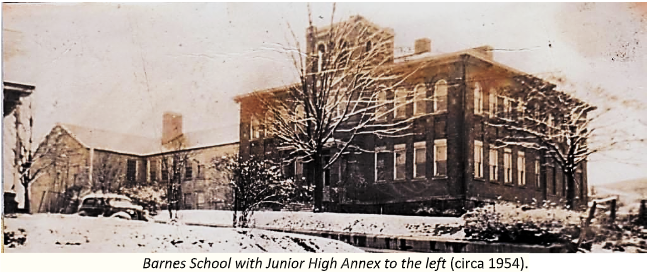Our Diverse Heritage: Marion’s Black History Part 12
Celebrating Black History Month in Marion County
February 16, 2024
Part 12: Lucile Jones Peoples
Lucile Frances Jones was born in May 1906 in Homestead, PA, daughter to William and Mary Jones. She began teaching during the Great Depression and opportunities were limited. She married Julius Peoples in Virginia on July 27, 1940, and he was a coal miner in Monongah, where they lived. The 1942 City Directory notes her as a teacher at Dunbar School.
When Dunbar closed, she was the music teacher assigned to Miller and Barnes School. At Barnes, she taught the junior high classes so those of us baby boomers who were in the junior high associate Mrs. Peoples with ‘spring concerts with girls in pastel dresses and boys in white shirts and dark pants!’
Her classroom had an upright piano that faced the two rows of U-shaped desks. Sometimes I felt as if she played the piano as she talked to us… a monologue with popular tunes. How could you not want to be in her classroom? She wove stories into her music—how she grew up in Homestead, PA, got a teaching position at Dunbar and her mother sent her youngest sister to attend this school because of its reputation. She also told us about Mr. Jones, her Italian Monongah neighbors, driving to Pittsburgh to shop at Gimbels, and her love of travel.
I reached out to those of us who are members of the Barnes Junior High Facebook page. The comments about her came almost immediately and she was remembered fondly. Several of the responders were in my 7 th grade class when we first encountered Mrs. Peoples and the music class. Nearly everyone who was in the classroom said, “I’ll never forget her reaction to President Kennedy’s Assassination.” This was a pivotal moment in history that I did not understand on the afternoon of Nov. 22, 1963. Most of us recall the same thing: a teacher and the principal came to the music room around 2 p.m. The teacher quietly whispered something to Mrs. Peoples. The class was silent. She reacted with a formidable and loud expression of disbelief so spontaneously that we knew something really bad had occurred. I think the principal said school was dismissed and we were to go home. “The President was killed,” she said after they left. She was crying and visibly shaken.
It wasn’t until many years later that I realized how important the Civil Rights Movement was to her. She had told us a lot about segregated society, but 7th graders were not really political back then and little may have been retained. However, I knew President Kennedy was important to her and the quest equitable society. Her short lessons about civil rights were presented in a matter-of-fact way. We knew Black teachers were lower paid, some lost their jobs, and old black schools didn’t have what they needed prior to integration. However, she regaled us with stories about Dunbar High School and its reputation for sports, excellence in academics and quality outcomes. She missed the end of a school’s traditions of Dunbar but focused on opportunities in the present. Bits of feminism were added from time to time as she spoke about being a divorced but independent woman. Her philosophy: anyone can
do what they set their mind to, with a little gumption and fortitude.
Mrs. Peoples died in 1971 and is buried in Shinnston. I still think about the junior high girls in pastel dresses.
